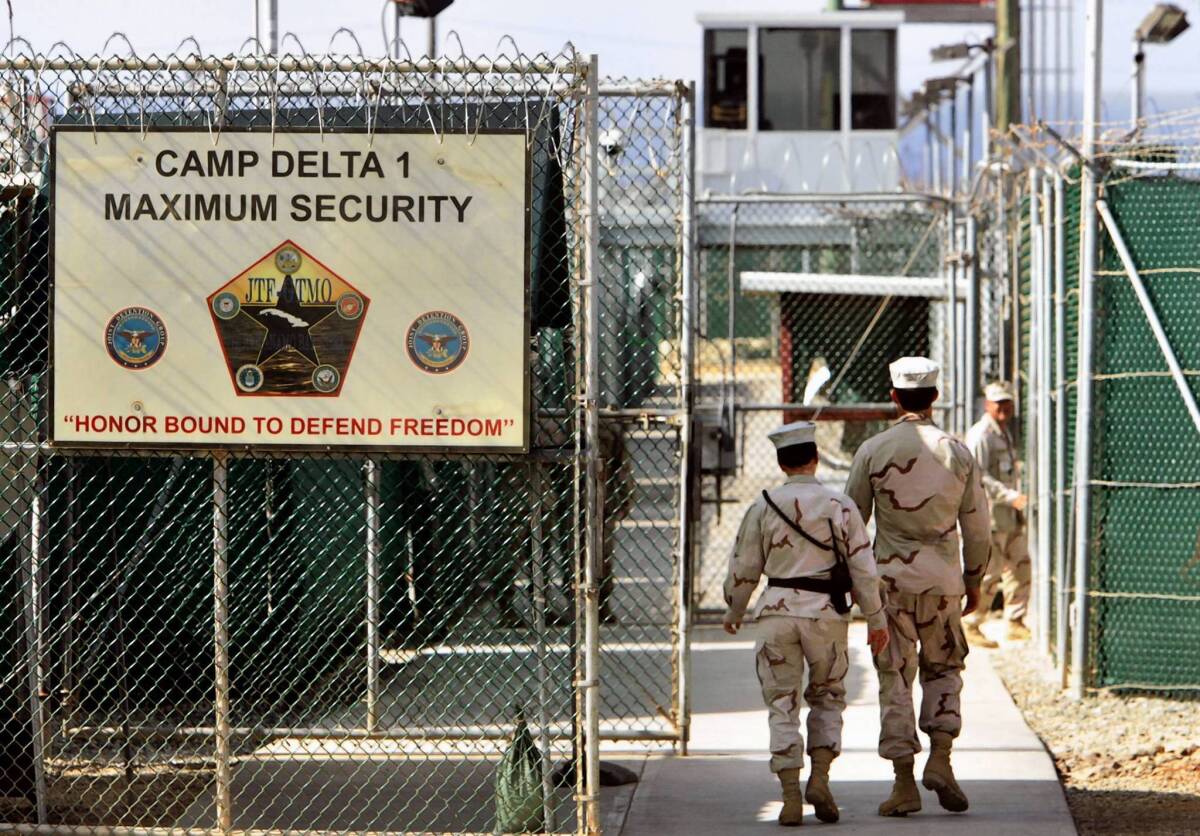Two Guantanamo Bay detainees to be returned to Algeria

- Share via
WASHINGTON — The Pentagon said Friday it was planning to send two detainees in the U.S. military prison at Guantanamo Bay, Cuba, to Algeria — the first transfers since President Obama announced in April that he would renew efforts to close the prison.
Release of the detainees, who were not identified, would end a near-total moratorium on transfers since early 2012. The announcement comes less than a week before Obama is scheduled to hold talks at the White House with President Abdu Rabu Mansour Hadi of Yemen to discuss repatriation of detainees from his country.
“As the president has said, the United States remains determined to close the detention facility at Guantanamo Bay,” White House Press Secretary Jay Carney said in a statement. He added that the decision to repatriate the two Algerians was being carried out “in consultation with the Congress, and in a responsible manner that protects our national security.”
The move leaves Obama far short of his goal of closing the prison, which now holds 166 inmates, but it was hailed by human rights advocates as a sign that the administration was making a new push after letting closure plans languish since early in his first term.
The move was “the sign we’ve been waiting for,” said Andrea Prasow, senior counter-terrorism counsel for Human Rights Watch.
The decision to send two Algerians home came after “a very senior interagency team conducted an intensive review of this matter” and recommended to Defense Secretary Chuck Hagel that he approve the transfer, according to Pentagon Press Secretary George Little.
Sen. Dianne Feinstein (D-Calif.), chairwoman of the Senate Intelligence Committee, said she supported the decision. “This is an important step toward closing the prison once and for all,” she said. “At a cost of $454 million annually — or $2.7 million per detainee — it is in the national security interests of the United States to transfer these detainees to their home countries.”
The two men are among five Algerians still held at Guantanamo. White House aides declined to describe what agreement, if any, had been reached with the Algerian government on the treatment of the detainees. Algeria’s security services have long been known for harsh treatment of Islamic fighters.
But when prisoners have been sent to Algeria in the past, they have been taken into custody by the government, questioned and in many cases quickly released, Prasow said.
“The crucial questions are whether the detainees want to be transferred to Algeria and whether they will face human rights violations there. Closing the detention facility must not mean transferring people to torture, indefinite detention or unfair trials,” said Zeke Johnson, director of Amnesty International’s Security with Human Rights campaign.
National Security Council spokeswoman Caitlin Hayden said transfer decisions were made after “detailed, specific conversations” about how the receiving country will handle the prisoners.
“The assurances must be tailored to mitigate the specific threat that a detainee may pose, and we must be convinced that the transfer is consistent with our humane treatment standards,” she said. “If we do
not receive credible assurances, the transfer does not occur.”
Transfers take about a month to process after the Pentagon signs off and Congress is notified, administration officials said. They would not say when the prisoners would be sent to Algeria.
A highly visible remnant of President George W. Bush’s counter-terrorism policies, the prison at the U.S. naval base in Cuba has frustrated the Obama White House. Obama pledged during his 2008 campaign to close it, saying the detention center was a “sad chapter” in U.S. history. He failed after fierce opposition in Congress to moving detainees not chosen for repatriation to a prison in the U.S.
But as dozens of Guantanamo’s detainees participated in hunger strikes to protest their indefinite confinement, as well as conditions at the prison, Obama renewed his call for Congress to close it and said he would pursue transfers and other steps to shrink the population.
Eighty-six prisoners, most of them from Yemen, were cleared for conditional transfer out of the prison in 2010. An additional 46 have been classified as impossible to put on trial.
But transfers largely ground to a halt in 2012, when the administration announced a moratorium
on sending detainees back to Yemen after determining that a plan to attack a U.S. airliner was plotted there.
Congress also required the administration to certify that transfers did not pose
a threat to U.S. security. Some lawmakers are moving to eliminate that requirement.
Sen. Patrick J. Leahy (D-Vt.) called Friday for Congress to remove the “unnecessary and counterproductive statutory impediments that, for too long,” had impeded prisoner transfers.
More to Read
Sign up for Essential California
The most important California stories and recommendations in your inbox every morning.
You may occasionally receive promotional content from the Los Angeles Times.















